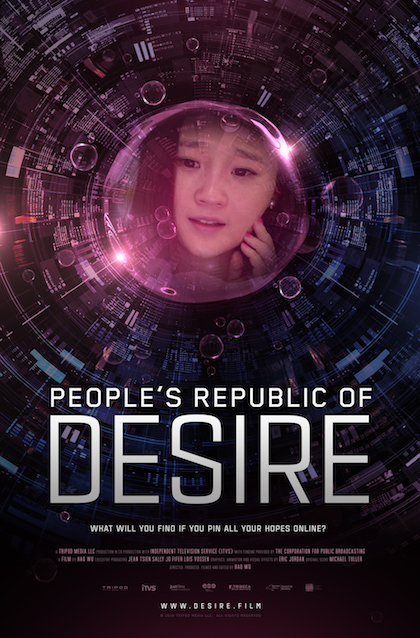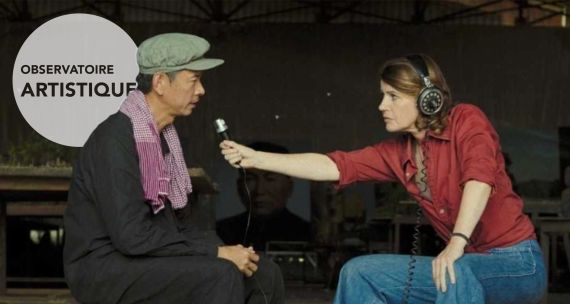"So, this was not a real documentary, right?" asked one of the work colleagues coming out of the first showing of Hao Wu's People's Republic of Desire, which depicts rather absurd, surreal stories of those involved in China's livestreaming industry. Indeed, the film focuses on a rather unbelievable industry from the perspective of Canadians. Wu shows how girls are coached professionally to earn more 'gifts' on their webcam shows, and a couple breaks up over the results of the annual tournaments on this platform, which seem to be nothing but an overblown popularity contest. But underlying all of this is the sheer scale and intensity of the industry—where literally hundreds of thousands of dollars flow across the platform in a matter of seconds. Beyond the seeming absurdity of it all, Hao Wu skillfully captures the current milieu of a Chinese society that has experienced an unprecedented accumulation of wealth, and the impact that the changes have had on ordinary people.
This documentary is loosely built around the lives of two live-streaming celebrities on YY.com, a popular live-streaming platform in China. The two hosts, Big Li and Shen Man, rise to stardom from humble backgrounds by performing on their live-streaming YY channels. As hundreds of thousands of fans shower them with fanatic love in the form of virtual 'gifts,' the hosts and the platform earn considerable revenues, and the gift-givers themselves get the opportunity to interact with these popular hosts. There are mainly two types of followers on this platform: the tuhao (wealthy 'patrons'), who would spend millions (in U.S. dollars!) to gain considerable virtual titles; and, the diaosi ('losers'), who are generally low-income earners like Yong, a migrant worker whose only form of leisure seems to be watching Big Li's shows on his cellphone after work. The popularity of the platform points to the widespread availability of the Internet across China, which allows the tuhao and the dioasi to interact on the same platform.
The larger arc of the film is the annual competition on the YY platform, where webcam show hosts compete for top prizes in multiple categories, and winners are celebrated in a widely broadcast pomp similar to the Oscars. The documentary follows Big Li and Shen Man's efforts to win the top place as the dynamic between the hosts, the tuhao, and the diaosi – along with the hidden forces that run this industry – plays out. Wu shows how one can "make it" and gain incredible wealth and prestige as an ordinary person through this platform – where one can earn millions of dollars and "climb up" the social ladder like Big Li and Shen Man have done. At the same time, Wu shows how quickly – and badly – they can fall as the documentary unfolds, underscoring the ephemeral nature of the industry.

Image Courtesy Vancouver International Film Festival
Beyond the absurdity of the scale and intensity of a medium like livestreaming, Wu skillfully uses the YY platform as a stand-in for contemporary China, capturing both the pace of the changes in society and their impact on individual lives. Today, YY.com is a NASDAQ-listed company that recorded US$34.5 million in earnings back in 2015, and it is only one of the numerous livestreaming platforms that the Chinese frequent today. In many ways, the YY platform is a microcosm of the Chinese economy, where one can skyrocket to fame and wealth in matter of hours, but can also crash just as quickly.
Moreover, by focusing on the individual stories of the "ordinary people" involved in the industry, Wu demonstrates the sense of isolation that that many Chinese millennials seem to experience today. Throughout the film, we see individuals surrounded by crowds, but each is fixated on their phones and therefore alienated from one another. The estrangement between Shen Man and her father demonstrates the generational gap between parents and children who have grown up straddling two different Chinas. Migrant workers like Yong and Big Li, who leave their families and their homes during their teenage years to find work in big cities, are often extracted from their support network. Yong is often depicted alone in his room, not finding sense of connectedness except when he watches Big Li. It is clear that the appeal of livestream is the apparent human connection, but also that it is not a sufficient replacement. Big Li attributes his success on YY to being able to console the diaosi, having been a migrant worker himself, but also continuously talks about the time when he was "happier" and "freer," before he became famous, and shows disaffection for his current life. As such, the film shows the Chinese millennials' attempt to find happiness and cope with reality in a rapidly changing society.
All in all, the documentary provides a unique insight into contemporary Chinese society and the economy through the stories revolving around YY.com, part of an industry that does not enjoy the same kind of prominence here in Canada. Moreover, the documentary sheds light on the personal stories of the Chinese youth who have experienced the rapid, glittering success of their country as a whole – and points to some anxieties shared by both millennials over there and here in Canada.
The Peope’s Republic of Desire is screening Thursday, October 4, 2018 at 1:45 pm at SFU Goldcorp. For more information and the VIFF 2018 festival guide, visit the Vancouver International Film Festival website at www.viff.org.






